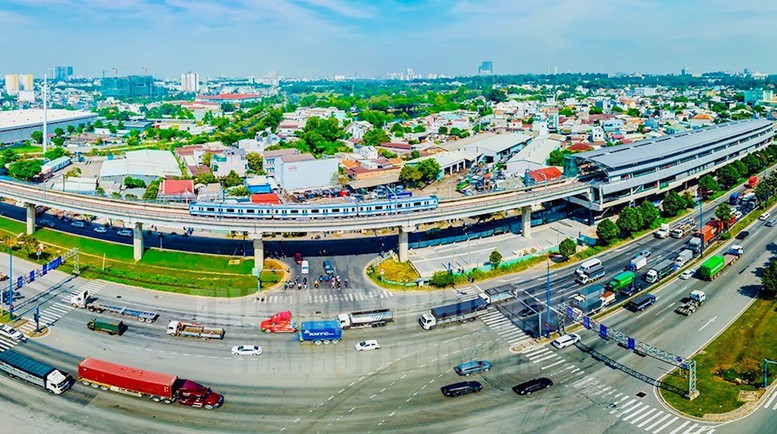Laws are only viable when they are enforced in social life in a regular, fair and meaningful manner, and applied to everyone.
In the context of Vietnam building and perfecting the socialist rule-of-law state, law enforcement must become a focus of reform. Resolution No. 66-NQ/TW of the Politburo clearly identified the requirement of "innovating and improving the quality of law-making and enforcement".
This is not just a technical orientation, but a strategic requirement for institutions. And if law-making is the first content, then the second content, law enforcement, is equally important in the strategic institutional breakthrough - "a breakthrough of breakthroughs" but also a "bottleneck of bottlenecks".
Clarifying the Conceptual Framework: The First Step of Innovation
Law enforcement is the process of putting enacted legal norms into practice through the actual actions of social actors. To analyze accurately and reform effectively, it is necessary to clearly distinguish four forms that constitute law enforcement activities, including:
1. Compliance with the law – is not performing acts prohibited by law (passive);
2. Compliance with the law - is the proactive performance of legal obligations that the law requires (proactive);
3. Use of law – is the exercise of legal rights that the law allows to do or not to do (selective);
4. Law enforcement – is the activity of a competent state agency, using public power to issue specific legal decisions (of state power nature).
Clearly distinguishing these forms is not only of academic value, but also helps to accurately determine the responsibilities of each subject, from citizens, businesses to public agencies. This also helps reform policies to be substantive, in the right place, in the right place - avoiding ambiguity and overlap, which are among the reasons why many reform policies do not achieve the expected results.
Associated with the above activities is the concept of compliance costs - a concept that now needs to be understood more broadly and accurately. Although the name is "compliance costs", in essence, this is the total cost that individuals, organizations, and businesses must pay to enforce the law in general - not only the cost to avoid violations, but also includes: costs to fulfill legal obligations (for example: tax declaration, installation of environmental protection equipment); costs to exercise legal rights (for example: applying for a business license, filing an administrative lawsuit); costs to understand and handle the ambiguity and overlap of legal regulations and costs arising from complicated and opaque administrative procedures.
Understood thus, compliance costs are not only a measure of the "heaviness" of legal regulations, but also an indicator reflecting the quality of the entire law enforcement system - from the capacity to make laws, organize implementation, to the efficiency of the public authority apparatus. A highly effective legal system is a system that reduces compliance costs at all stages , creating conditions for people and businesses to implement the law in a convenient, transparent and trustworthy manner.
The current legal system has greatly expanded the rights of citizens and businesses.
Current issues in law enforcement in our country
1. Compliance with the law: When "lawlessness" becomes a social habit
Compliance with the law is the most basic form – when people and businesses do not do things that are prohibited by law. However, this is also the form that most clearly shows the current state of "lawlessness".
Violations of the law occur commonly in many areas: traffic, environment, construction, urban order, land... In urban areas, encroachment on sidewalks and illegal construction are no longer isolated incidents; in rural areas, illegal sand mining and uncontrolled waste discharge occur before the eyes of local authorities, and many cases are not thoroughly handled. According to the Ministry of Transport (now the Ministry of Construction ), in 2023 alone, the country recorded more than 2.3 million cases of traffic violations that were punished - a number that reflects the prevalence of non-compliance with the law at the simplest level.
It is worth noting that: the level of penalties in many areas is very high, even exceeding the average level of many developed countries. But violations are still widespread. This shows that deterrence does not necessarily depend on the severity of the sanctions, but on the ability to detect and handle them promptly and consistently. People comply not only because of the high fines, but mainly because they believe that "if I violate, I will be punished and there will be no exceptions". Here, the worrying thing is not just the laxity in enforcement, but the decline in faith in the fairness and inevitability of the law - which is the foundation of a society governed by law.
2. Compliance with the law: Legal obligations are neglected in practice
Compliance with the law is when individuals and organizations fulfill their legal obligations as required by law – from tax declaration, residence registration, environmental protection to implementing decisions of state agencies. However, currently, many regulations are issued but not implemented or implemented in a formal way.
A common cause is that regulations are not feasible, not suitable for local practices or applicable subjects. But more importantly, there is a lack of enforcement mechanisms with clear responsibilities. For example, many social policies, administrative reform programs or commune-level digital transformation plans remain "hanging" on paper because officials do not implement them or are not held accountable if they do not.
In addition, the dispersion of responsibilities among agencies, the lack of clarity about who is primarily responsible for many reform programs, action plans, and implementation regulations has led to delays or formalities due to the lack of specific responsibilities. This is a manifestation of the degradation of administrative and legal discipline, reducing the effectiveness of state management and weakening the law enforcement capacity of the political system.
3. Using the law: Having rights but not easily exercising them
Using the law is when individuals and organizations proactively exercise their legal rights that the law allows - such as the right to do business, complain, denounce, access information...
In theory, the current legal system has greatly expanded the rights of citizens and businesses. However, in reality, the implementation of rights faces many barriers in terms of procedures, administrative attitudes and people's ability to access the law.
VCCI's 2022 report shows that: 59% of businesses have to "pay bribes" to be licensed or carry out administrative procedures, even though in principle they have legal rights. On the contrary, many people are afraid of conflict with the government, lack legal knowledge, or do not believe in the effectiveness of the rights protection mechanism - leading to the mentality of limiting their own rights, or giving up their rights in silence.
The phenomenon of "having rights but not being able to exercise them" is a silent but serious form of loss of rights, because it erodes the protective role of the law and hinders the autonomy of society.
4. Law enforcement: The most powerful, but also the most in need of improvement
Law enforcement is an activity of public power - when a competent state agency issues specific legal decisions such as sanctioning violations, granting licenses, resolving complaints, adjudicating...
This is the stage that most clearly demonstrates State power, but it is also the place where many risks of abuse of power, arbitrariness and injustice arise if not well controlled. In reality, many administrative decisions lack a clear legal basis, are unfair, or are "flexibly applied" in a biased direction for local interests. Part of the reason comes from the limited legal knowledge and situation handling skills of officials; the other part is due to the lack of an independent monitoring mechanism and a lack of tools to make the decision-making process transparent.
Even in the judicial sector – which is considered the “most cautious” – the rate of judgments annulled or amended due to incorrect application of the law at the first instance level still fluctuates between 1.5–2.5% (2016–2021 period), according to the National Assembly ’s supervision. This shows that the capacity to apply the law – in terms of people, processes and institutions – is still the biggest bottleneck in the operation chain of the rule of law state.
A society is truly governed by the rule of law only when the law is internalized as a moral value – where people do not obey it simply because they fear punishment, but because they feel ashamed if they violate it, and proud if they live by the law.
Solution: Restore the validity and affirm the dignity of the law
A legal system cannot be truly present if it is only well-designed on paper. Laws can only be vital when they are implemented in social life in a regular, fair and meaningful manner, and applied to everyone. Therefore, innovation and improvement of the quality of law enforcement cannot stop at amending laws or propaganda, but must be a synchronous and systematic effort - from enforcement mechanisms to compliance culture, from public service skills to community trust. Based on the four constituent forms of law enforcement - compliance, execution, use and application of the law - five key groups of solutions can be established as follows:
First of all, regarding law enforcement , the problem is not the severity of sanctions, but the effectiveness of enforcement. When people see that violations are not handled or are only handled selectively, they will automatically consider the law as "good to have, not to have". Therefore, it is necessary to restore the necessity and fairness in law enforcement. This requires improving the capacity to detect and handle violations right from the grassroots level, promoting community monitoring mechanisms, and strongly applying technology such as traffic cameras and administrative violation warning systems. More importantly, handling decisions must be made transparently, without exception - to affirm a clear message: violating the law is a behavior that is rejected by society, not "negotiable flexibility".
Second, regarding law enforcement , it is necessary to rebuild public discipline and responsibility for fulfilling legal obligations in the administrative system. It is necessary to clearly define the legal obligations of each unit and each cadre, linked to a quantitative assessment mechanism and public disclosure of results. Inspection and examination should not only focus on violations, but must also cover neglected obligations. Rewarding units that comply and strictly handling places that ignore the law is the way to restore discipline and restore the effectiveness of law enforcement organizations.
Along with strengthening public discipline, it is also necessary to focus on raising awareness and law-abiding capacity of citizens and businesses . Many seemingly obvious legal obligations – such as tax declaration, temporary residence registration, environmental protection, compliance with fire prevention and fighting regulations, etc. – are still taken lightly or deliberately avoided, especially in the informal sector. The reason is not necessarily due to lack of goodwill, but sometimes due to lack of understanding, lack of specific guidance , or due to cumbersome and unfriendly procedures.
To improve this situation, it is necessary to: Standardize and simplify legal obligations for citizens and businesses , clearly present them on the public service portal, and integrate them into digital applications; increase legal support for small and medium-sized enterprises and individual business households - through consulting centers, professional associations, and social organizations; implement "education on legal obligations" from schools to the community , so that people understand not only their rights, but also their responsibilities as citizens of the rule of law; build a mechanism to remind, warn, and support compliance with legal obligations instead of only applying sanctions after violations have occurred.
Law enforcement cannot rely solely on coercion, but must be constructed as a civilized and proactive behavior – in which the State supports, people understand, businesses cooperate, and the whole society raises legal standards.
It is necessary to standardize and simplify legal obligations for citizens and businesses, clearly present them on the public service portal, and integrate them into digital applications.
Third, regarding the use of law , law is only truly meaningful when people and businesses can exercise their rights conveniently, safely and are protected if they are violated. Administrative procedures need to be reformed in a direction that puts the rights of people and businesses at the center - meaning that public agencies do not have to "grant permission" but have the obligation to ensure the rights that have been established. At the same time, it is necessary to expand the legal aid network and disseminate the law in more familiar and vivid forms. Equally important is to strengthen trust in the rights protection mechanism - when people believe that if their rights are violated, they can speak up and will be protected by the law fairly and effectively.
Fourth, regarding law enforcement , this is the stage where state power is most directly and concretely demonstrated – and also the most vulnerable if it is distorted. Therefore, improving the quality of law enforcement must be at the heart of all reforms. First of all, it is necessary to standardize and improve the capacity of law enforcement officers – from procedural officers, police, inspectors to judges… through practical training, situation handling skills training and public service ethics training. In addition, the law enforcement process needs to be transparent, traceable and arbitrariness should be minimized. Strengthening the mechanism of cross-monitoring, supervision by society, the National Assembly, the Fatherland Front and the press is a condition for public power to be controlled. Finally, it is possible to pilot a set of indicators to assess the quality of law implementation (Legal Implementation Index) at the local level, to clarify the implementation capacity of each sector and each official - thereby having an objective basis for adjusting policies and personnel.
And finally – but perhaps most fundamentally – is the group of solutions on cultural depth . Law cannot be sustainable if it only relies on coercion and punishment. A society is truly governed by law only when the law is internalized as a moral value – where people do not obey it just because they fear punishment, but because they feel ashamed if they violate it, and proud if they live by the law. To do that, it is necessary to create a culture Rule of law – where the law is communicated as a way of life, told through cinema, art, social media, not just through resolutions or conferences. The model of a citizen under the rule of law – someone who understands the law, does what is right, knows how to protect what is right and does not compromise with what is wrong – needs to be educated early, spread through the media and honored in the community. In public agencies, schools and businesses, it is necessary to form a culture of "saying no to violations", protecting those who do the right thing and creating moral pressure on wrongdoing. When people begin to feel that living by the law is a manifestation of personality, then law enforcement will have a cultural foundation for sustainable development.
In short, reforming law enforcement cannot be a separate piece of the national governance system, but must be a comprehensive reform – from sanctions to organization, from people to culture. It is a reform to restore the effectiveness of the law, enhance the dignity of public service, and foster social trust in fairness and justice. When people obey the law because they trust, obey the law because they are responsible, use the law because they are protected and witness the fair application of power – then the law is no longer a tool – but becomes a symbol of a civilized, self-respecting and trustworthy nation.
Dr. Nguyen Si Dung
Source: https://baochinhphu.vn/thi-hanh-phap-luat-nghiem-minh-quoc-gia-vung-manh-102250527062450282.htm










![[Photo] Vietnamese and Hungarian leaders attend the opening of the exhibition by photographer Bozoky Dezso](https://vphoto.vietnam.vn/thumb/1200x675/vietnam/resource/IMAGE/2025/5/29/94d8ceca5db14af3bf31285551ae4bb3)
![[Photo] Prime Minister Pham Minh Chinh meets with Hungarian President Sulyok Tamas](https://vphoto.vietnam.vn/thumb/1200x675/vietnam/resource/IMAGE/2025/5/29/dbcaa73e92ea4448a03fe1d0de6d68e8)


















![[Photo] Prime Minister Pham Minh Chinh receives a bipartisan delegation of US House of Representatives](https://vphoto.vietnam.vn/thumb/1200x675/vietnam/resource/IMAGE/2025/5/28/468e61546b664d3f98dc75f6a3c2c880)





























































Comment (0)